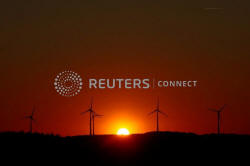Investing green is all the rage, but benchmarks still hazy
 Send a link to a friend
Send a link to a friend
 [September 13, 2019] By
Swati Pandey and Patturaja Murugaboopathy [September 13, 2019] By
Swati Pandey and Patturaja Murugaboopathy
SYDNEY (Reuters) - Global money managers
and companies are rushing to meet a deadline to report on their carbon
footprint, but the lack of a standard metric raises concerns their
efforts could just be a box-ticking exercise in the transition from
brown to green.
From 2020, firms with some $118 trillion of funds under management -
among 800 signatories to a United Nations pact - will make climate-risk
related disclosures as an early step towards making the world a better
place by 2030.
The problem with assessing carbon footprints is that there are no
universal criteria for benchmarking environmental, social and governance
(ESG) - the key factors in measuring the sustainability and ethical
impact of an investment.
"The way you quantify climate impact and consider transition risks could
differ from company to company," said Stephane Andre, a Sydney-based
portfolio manager at Alphinity Investments which has A$8.2 billion
($5.65 billion) in assets under management.

"There is no prescriptive way to look at it," he added. "What it means
is in the short term there might be limited value in it."
That hasn't stopped stakeholders such as Andre from piling pressure on
companies to tackle the 17 United Nations 'sustainable development
goals' such as zero hunger, gender equality and clean energy.
Mining titan BHP Billiton <BHP.AX> surprised markets this year when it
announced plans to cut carbon emissions not just at its own facilities
but for its customers as well. It exited some coal projects, on the
heels of rival Rio Tinto <RIO.L>.
Large banks have begun disclosing their carbon exposures while setting
targets for clean lending, while insurers including Chubb <CB.BN> <CB.N>
and Suncorp <SUN.AX>, have moved away from coverage for new coal
projects.
Top U.S. retailer Walmart <WMT.N> said this month it would stop selling
ammunition for handguns in all its stores across the country and
Australia's Woolworths <WOW.AX> became the first supermarket chain in
the world to issue a certified climate bond this year.
Despite a blitz of such corporate announcements, fund managers are
constantly trying to differentiate between genuine ESG and spin by
looking for deeper disclosures from the companies they screen, in areas
such as gender pay gap and relationship with employees and suppliers.
But not all companies publish data on ESG impact yet, and analyzing data
from those that do is also challenging. "Data isn't always readily
available, and not all investors have access to advanced analytical
tools or various ESG data sets," said Jessica Huang, head of Americas
and APAC platform for Blackrock Sustainable Investing. "Investors often
rely too much on historical data, which may not provide an accurate
prediction of future trends."
ESG SCORE
Some investment managers use so-called ESG ratings provided by firms
such as Fitch Ratings.
[to top of second column] |

Power-generating
windmill turbines are pictured during sunset at a wind park in
Campeneac, France, September 3, 2019. REUTERS/Gonzalo Fuentes

One MSCI study found that companies with higher average ESG ratings had lower
risks, greater profitability and higher dividend yields. Yet, those ESG scores
are based on the levels of disclosure by a company, not an actual assessment of
practices.
Worryingly, a comparison of FTSE and MSCI ESG scores has hardly any correlation,
said Mike Lubrano, managing director for corporate governance & sustainability
at Cartica Management.
Variations in the components and weightings of the underlying metrics used by
different index providers also generate widely divergent scores, he noted.
Despite the challenges of measuring ESG performance, investments in the stream
are rising. Investors believe that if companies do well on ESG metrics, such
focus will make their businesses more sustainable in the long term.
Indeed, an analysis of the top 500 companies in Asia, based on ESG metrics,
shows their average returns outperformed the broader MSCI Asia Pacific index
<.MIAPJ0000PUS> each time in the last 10 years.
(GRAPHIC: Asian ESG leaders' price performance - https://tmsnrt.rs/2Adko9m)
Data from Lipper showed assets under management of ethical, water and
alternative energy funds in Asia climbed 16% to $28.5 billion in the first half
of 2019 from a year ago.
In debt markets, climate bond issuances surpassed $150 billion this year though
still a far cry from the $1 trillion goal for 2020, according to Climate Bonds
Initiative.
The increased momentum has meant that banks are engaging more actively with
their corporate clients while shareholders are rallying behind green groups
demanding companies cut emissions, lift governance and improve social
responsibilities.
So called responsible investors also shun industries that negatively affect
society, including companies that produce or invest in alcohol, tobacco,
gambling and guns.
Such activism prompted Australian supermarket giant Woolworths <WOW.AX> to
finally agree, after years of engagement with investors, to offload its
profitable pub and liquor business in July.
"Poker machines are horrible things but they are very profitable," said Bruce
Smith, another portfolio manager at Alphinity. "Once they get rid of that
business, Woolworths will become a possible investment for us."
Woolworths did not specifically comment on its decision, saying only that the
move would help it simplify its structure and focus on the retail business.
(Additional reporting by Gaurav Dogra in BENGALURU; Editing by Vidya Ranganathan
and Jacqueline Wong)
[© 2019 Thomson Reuters. All rights
reserved.] Copyright 2019 Reuters. All rights reserved. This material may not be published,
broadcast, rewritten or redistributed.
Thompson Reuters is solely responsible for this content. |